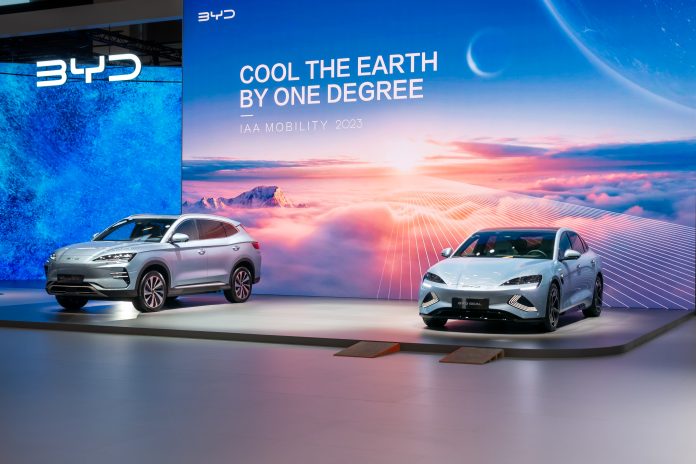
By Irakli Machaidze, a Georgian political writer, analytical journalist and fellow with Young Voices Europe. Irakli is currently based in Vienna, Austria, pursuing advanced studies in International Relations. He specialises in EU policy and regional security in Europe.
The rapid rise of Chinese electric vehicle sales in Europe might seem like a dream come true for consumers and the European Green Deal, with their sleek design, top-notch quality, and wallet-friendly prices. However, hidden beneath the shiny exterior lurks a looming economic and security nightmare. As Chinese electric vehicles inundate the market, they jeopardise the survival of European manufacturers and put millions of jobs at risk. The incorporation of advanced technology in these vehicles also raises concerns around data privacy and national security.
These vehicles represent a new generation of cars, packed with technology aimed at enhancing consumer experience. However, this technology comes with a dark side, which also concerns US lawmakers and was investigated in Australia. It includes data collection capabilities which, while purportedly designed to cater to consumer needs, could pose significant risks. Concerns about data breaches and surveillance loom large, with some analysis suggesting the cars’ systems may have the ability to collect, store and export data about their users. It may be that in Europe’s rush to embrace electric cars, we have forgotten security considerations.
China’s share of EVs sold in Europe has surged to 8% and could reach 15% by 2025, according to the European Commision. Low prices are driving this explosion in sales, with the typical price tag sitting 20% lower than comparable EU-made models. The motor vehicles manufacturing sector holds critical significance for the EU, generating a trade surplus of over €100 billion for the bloc. The sector also accounts for 6.1% (13.8 million Europeans) of total EU employment.
European Commission President Ursula Von der Leyen often emphasises the significance of electric vehicles in achieving the EU’s ambitious environmental goals. Well-subsidised Chinese cars can be part of Europe’s transition to low-carbon mobility at a lower cost. However, it is important to recognise that Chinese EVs are more than just vehicles. Modern cars are already gathering data to train artificial intelligence for autonomous driving. Within the vehicle, both driver and passenger behaviour are monitored, while outside, sensors track and analyse the surrounding environment. Consequently, determining who manages these data flows and software updates is far from a trivial matter.
Very big!
Center-right EU People’s Party will no longer campaign to scrap 2035 ban on sale of combustion engine vehiclesaccording to draft election manifesto seen by POLITICO
If would be a victory for von der Leyen set to be EPP's lead candidate for EU. https://t.co/dTa6JZXIiE
— Jean-Michel Glachant (@JMGlachant) February 23, 2024
Chinese subsidies
Beijing’s industrial policies, characterised by substantial subsidies, played a significant role in catalysing the EV revolution. When Chinese companies enter the European market, it is only logical to harbour suspicions that the Chinese government’s financial investments are made with anticipated benefits for them.
The European Commission is investigating the potential impact of Chinese EV imports on European producers and contemplating the imposition of punitive tariffs on Chinese EVs. This investigation spans a wide array of potentially unfair subsidies. At the same time, the Commission has announced its prioritisation of examining the cybersecurity implications of connected and automated vehicles, including Electric Vehicles.
However, a more comprehensive debate remains absent, as policymakers continue to shield themselves behind long periods of investigation and so-called “strategic planning”. Within the corridors of Brussels, a dilemma persists. An ill-considered battle against Chinese EVs could increase the costs of Europe’s own path toward a greener future, potentially undermining the policies they hold in high esteem.
Western climate and net zero policies are so stupid:
1. One-in-three EVs sold in the UK last year were made in China.
2. China's BYD now sells more EVs than @Tesla.
3. "The harsh truth is that China has weaponised net zero, and turned it into a way of seizing industrial… pic.twitter.com/KoVmZBX0EU
— Steve Milloy (@JunkScience) February 23, 2024
What to do?
In order to navigate EV competition successfully without harming itself, the EU must embrace a comprehensive strategy. This approach should strategically use interdependencies with emerging economies, implement security measures to mitigate critical dependencies, and provide financial incentives to alleviate risks associated with the most difficult dependencies.
Severing ties overnight with Chinese suppliers is no longer feasible due to limited alternative sources for diversified inputs such as raw materials, coupled with high production costs in Europe. The EU must therefore forge new partnerships with less risky counterparts.
Most EU states offer financial incentives for EV buyers but lack requirements for diverse supply chains. Despite the Critical Raw Materials Act aiming to boost EU self-sufficiency, more action is needed. The EU needs to do more to boost competitive EV production, potentially by scrapping protectionism both within the EU and between the EU and the rest of the world, to strengthen our industry, while of course also challenging strongly subsidised imports from China at the WTO level. Europeans possess strong brand loyalty, infrastructure, and a skilled workforce, which can be leveraged as a tool to combat reduced price differentials.
In order to guarantee maximum consumer protection and transparency, the EU and member state governments should expedite the implementation of regulations across the entire single market. They can stem the influx of Chinese electric vehicles into Europe by revising technical requirements and establishing more robust transparency regulations regarding data storage and transfer.
Policymakers should mandate manufacturers to demonstrate that Chinese state authorities cannot interfere with data processing, as they did with 5G. On the other hand, it is crucial for the EU to avoid a repeat of the situation faced by its solar panel industry which was decimated by cheaper imports from China.
The threat posed by Chinese electric vehicles to Europe’s competitiveness and security demands a robust debate on trust and industrial capacity. The EU faces a crucial decision: to what extent should it rely on Chinese companies for the digital and green transition? There is no easy answer, but continuing down the current path is fraught with problems.
Disclaimer: www.BrusselsReport.eu will under no circumstance be held legally responsible or liable for the content of any article appearing on the website, as only the author of an article is legally responsible for that, also in accordance with the terms of use.












